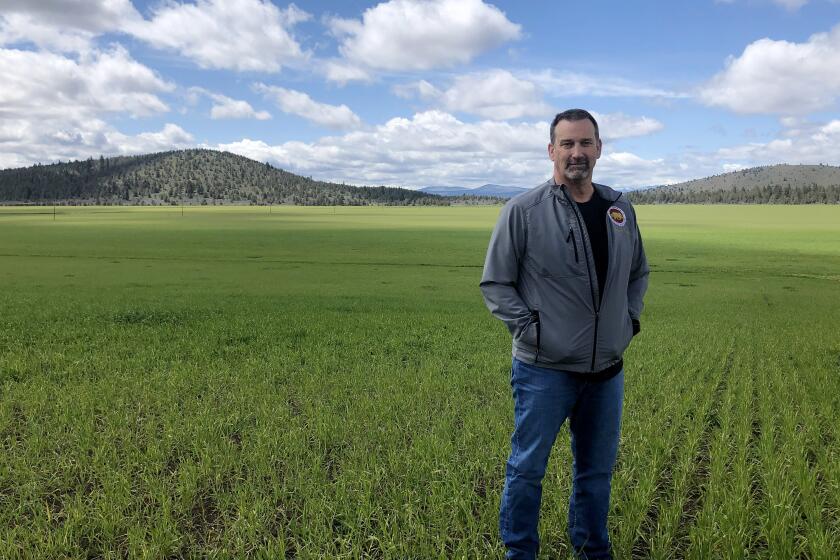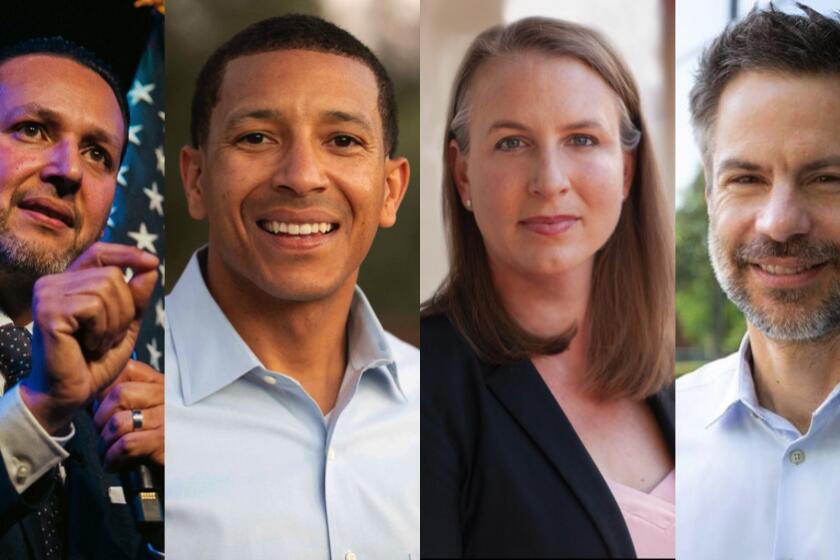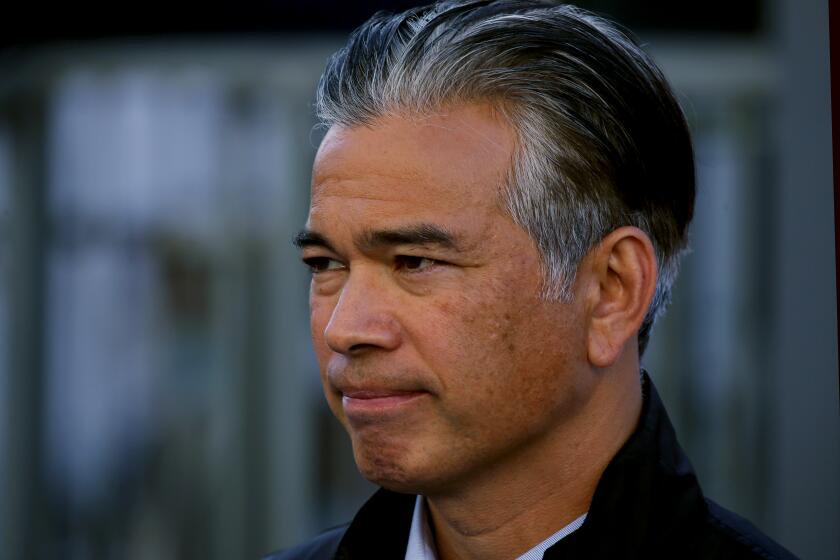Newsom, Bonta way ahead as California voters lean partisan, Times poll finds
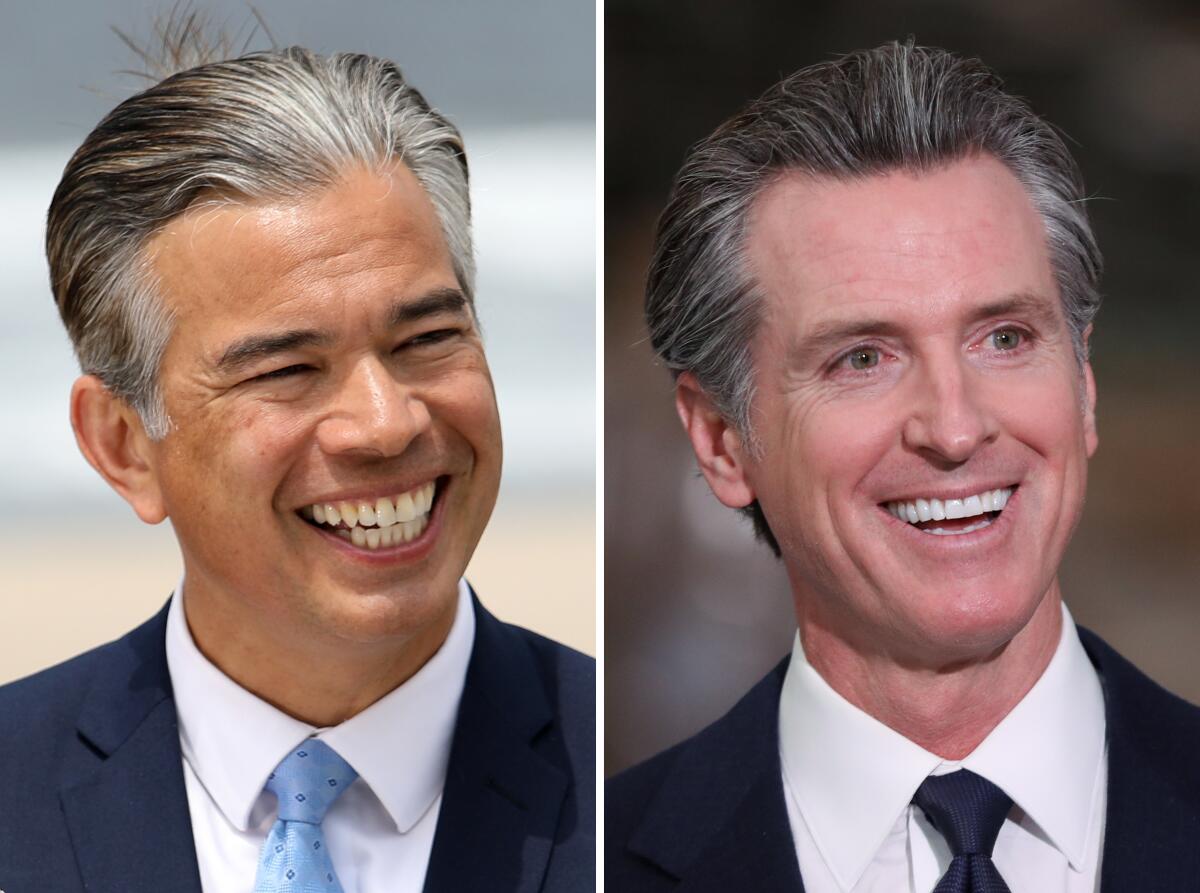
SACRAMENTO — Voters will likely stick with their partisan preferences in two of California’s most consequential state primary races, giving Gov. Gavin Newsom and state Atty. Gen. Rob Bonta an easy leg up in the June 7 election, according to a UC Berkeley Institute of Governmental Studies poll co-sponsored by the Los Angeles Times.
Newsom’s massive lead not only suggests that he’ll swamp the field of 25 challengers in next week’s gubernatorial primary but also that none of the candidates, at this point, has amassed enough support to be a credible threat in a one-on-one match in the Nov. 8 general election.
According to the poll, half of likely voters support Newsom — including 83% of Democrats and 46% of voters registered as having “no party preference.”
In the race for California’s top cop, Bonta is similarly well-positioned to best any of his four opponents, with 46% of likely voters saying they support him. Newsom appointed Bonta to the job last year and he is now running his first statewide campaign in a bid for a full four-year term.
“The overall picture is pretty encouraging for the incumbents,” said Eric Schickler, co-director of the Institute of Governmental Studies.
Dan Newman, a political consultant to Newsom, called the poll’s findings a “tremendous vote of confidence in his leadership through very challenging times.”
Democratic U.S. Sen. Alex Padilla, appointed by Newsom less than two years ago, also goes into the primary with a significant edge. According to the poll, 44% of likely voters support him, with conservative Republican attorney Mark Meuser a distant second with 14% support.
For the record:
7:43 a.m. June 3, 2022An earlier version of this article misidentified Christy Wilson as a Republican political consultant. Wilson is a political consultant but said she is not a registered Republican.
Political consultant Christy Wilson said Newsom “largely won his reelection when he beat the recall” effort in September and, as a result, no big-name challengers surfaced to challenge his 2022 bid for reelection. The lack of drama in California’s premier races has sapped voter enthusiasm, she said, which could suppress voter turnout.
June 7 primary election
Who’s ahead in the race for Los Angeles mayor? Final poll results Sunday.
“Most people I’ve talked to said there’s just nothing compelling to them on the ballot,” Wilson said.
The Republican Party’s dismal track record in statewide races in California for almost two decades has inspired homelessness policy advocate Michael Shellenberger to believe he might have a shot at knocking off Newsom as an independent candidate. Shellenberger blames Newsom and California’s other Democratic leaders for sending the state into a tailspin, saying they’re responsible for the homelessness crisis, rising violent crime and skyrocketing housing prices.
Shellenberger, who has raised roughly $1 million for his campaign, ran for governor as a Democrat in 2018 and drew less than 1% of the vote. The UC Berkeley-L.A. Times poll found that he might do better this time around, with 5% of likely voters saying they favor him.
Interestingly, the poll found that Shellenberger’s biggest kernel of support came from Republicans. Among those polled, 10% of Republicans said they supported Shellenberger, compared with 8% of independent voters and 1% of Democrats. Schickler, however, said Shellenberger needs to also appeal to Democratic voters to have a shot, since they outnumber Republicans by a ratio of close to 2 to 1.
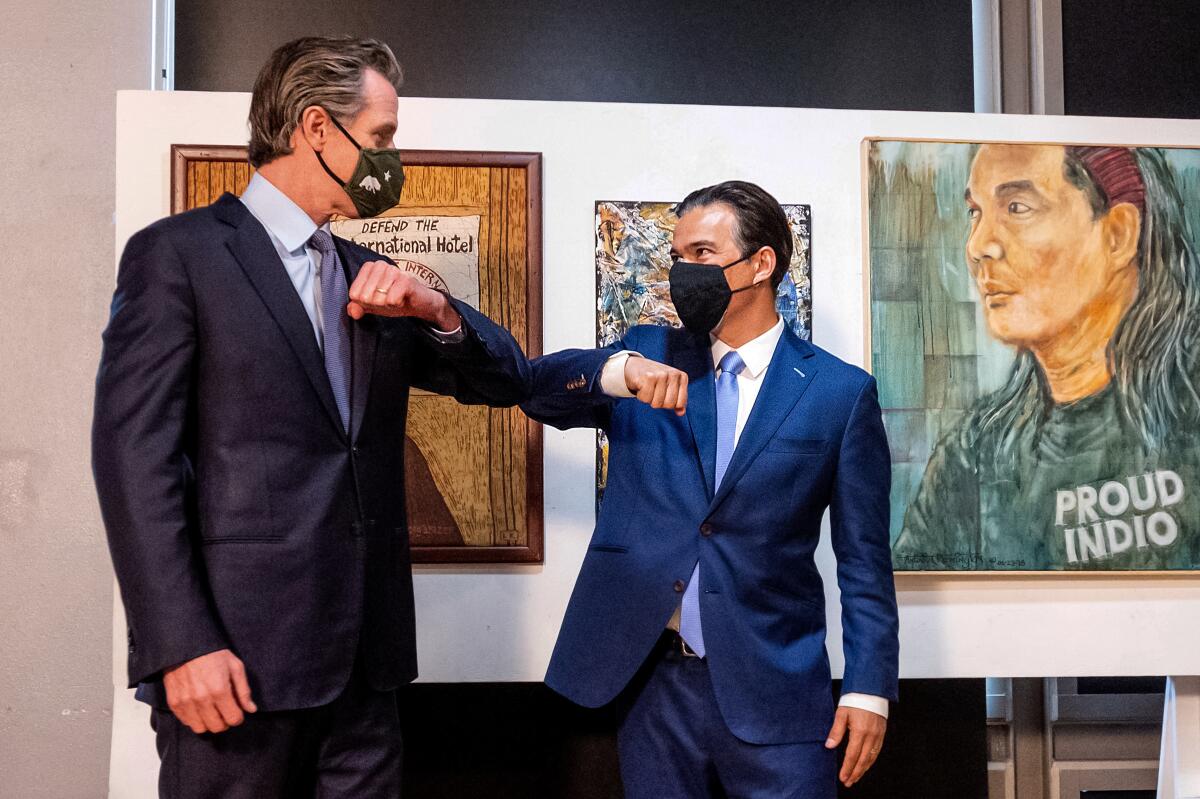
“This is a tough race,” Republican state Sen. Brian Dahle said about his decision to challenge Democratic Gov. Gavin Newsom.
“There are Democrats who don’t love Newsom. If [Shellenberger] could have gotten a fair number of those votes, maybe he becomes a kind of focal point for opposition,” Schickler said.
Shellenberger trails the top Republican in the race, state Sen. Brian Dahle of Bieber, who had the support of 10% of those surveyed — including 26% of Republicans and 8% of independents.
Although that’s not a wide lead, Dahle’s endorsement by the California Republican Party and his long history of winning elections in Northern California will probably attract more support when voters who said they are now undecided ultimately cast their ballots, Schickler said. Nearly 1 in 4 Republicans said they were undecided.
“As a Republican, he would have an advantage over wooing those votes,” Schickler said.
Newsom already has been attacking Dahle by name in political ads, targeting the Republican’s opposition to abortion rights and saying he “stands with” former President Trump. Those attacks might have helped elevate the state senator’s name identification across California, and hint that Newsom might prefer going up against a Republican in November rather than an independent like Shellenberger.
Dahle said he’s confident that he’ll finish in the top two in the gubernatorial primary, which would put him and Newsom in a face-off in November. He believes Californians have lost confidence in Newsom’s ability to address homelessness, rising violent crime and increasing gasoline and housing costs that make the state unaffordable.
“We understand that California is a blue state. There’s no doubt about it, but there’s also a lot of frustration,” Dahle said. “There’s a clear choice of different philosophies and policy.”
The poll found that none of the other candidates in the race for governor breached the 3% mark for voter support. Attorney and military officer Shawn Collins and advertising executive Anthony Trimino, both Orange County Republicans, were backed by 3% of likely voters; Republican business consultant Jenny Rae Le Roux and Republican businessman Major Williams were both supported by 2%. Nearly 16% of voters said they were undecided.
The most active among the list of long-shot candidates to challenge Gov. Gavin Newsom have each raised six-figure sums for their campaigns.
The pattern repeats itself in the race for attorney general.
Bonta’s comfortable lead over his top three challengers contradicts arguments that voters are desperate for a new attorney general to tackle California’s crime problems and push back against a criminal justice reform movement that the attorney general championed during his time in the Legislature.
Seventy-seven percent of Democrats support Bonta, according to the survey of likely voters, along with 38% of unaffiliated voters. A majority of each racial group surveyed — white, Latino, Black, Asian and Pacific Islander, and Native American — also said they backed Bonta.
“I think the results just underscore what we’re seeing across the board,” Nathan Click, Bonta’s spokesperson, said about the poll results.
Eric Early, a Los Angeles attorney seen as the ultra-conservative candidate in the race, had 16% of the likely vote, and fellow Republican and former Assistant U.S. Atty. Gen. Nathan Hochman had 12%.
Thirty-nine percent of likely Republican voters backed Early, with most of his support among those who said they are “strongly conservative.” Hochman, seen as more of an establishment candidate and endorsed by the California Republican Party, received 30% of support from likely GOP voters.
Schickler said Republicans tend to favor the more conservative candidate on the ballot, which could explain why Early has done well so far among likely voters. But although that could help propel him out of the primary, it might not be enough to win the November election.
Bonta’s supporters see an opportunity in having Early on the ballot in November. They recently produced radio ads that paint Early as a “true conservative” and “huge Trump supporter” while touting his support for broad gun ownership rights and opposition to abortion. In California’s top-two primary system, that effort could help send Early to the general election, with the idea that Democrats’ voter registration advantage would allow Bonta to more easily win against a staunch conservative.
The progressive incumbent Rob Bonta will have to defend his record against tough-on-crime campaigns including Anne Marie Schubert’s.
Unsurprisingly to some political insiders, Sacramento County Dist. Atty. Anne Marie Schubert’s bid as an untraditional independent candidate has so far failed to gain traction among voters. The career prosecutor and former Republican is most well-known for her work on the arrest and conviction of the Golden State Killer and other serial murderers and rapists in California, a record she hopes will appeal to a wide spectrum of Californians.
But the survey indicates her message has so far failed to transcend partisan politics. Only 6% of likely voters said they support Schubert, which includes 4% of both Democrats and Republicans and 11% of independents.
“It does speak to the challenges that a no party preference candidate faces,” Schickler said. “Republican voters want to vote for Republican candidates, just like Democratic voters vote for Democratic candidates. So then you’re basically relying on the pool of no party preference voters, and a lot of those folks are less interested in politics, less engaged. Some of them are quite informed, but often not as informed.”
Rob Stutzman, Schubert’s campaign strategist, said their focus over the next several days is on driving participation among independents, on whom they’ve relied to make up the majority of her voter base. Stutzman also saw an opportunity in the 19% of likely voters who said they were still undecided on a candidate for attorney general, which includes 24% of unaffiliated independents.
“We think Anne Marie has a very reliable base for being an independent candidate. We would really like to see NPP voter participation rise over the next few days,” Stutzman said. “I think it’s going to be jumbled between the two Republicans and her. We’re still optimistic ... that we’ll be in the mix Tuesday night.”
The poll was conducted online in English and Spanish, from May 24 to 31, among 5,210 California registered voters, of whom 3,438 were considered likely to vote in the June primary. The margin of error is estimated at approximately 2 percentage points in either direction. Full question wording and description of the poll methodology can be found on the Berkeley IGS website.
More to Read
Sign up for Essential California
The most important California stories and recommendations in your inbox every morning.
You may occasionally receive promotional content from the Los Angeles Times.
